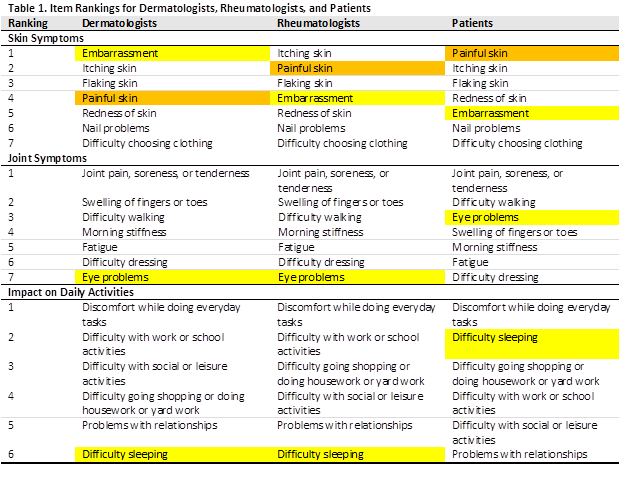Session Information
Session Type: ACR Poster Session A
Session Time: 9:00AM-11:00AM
Background/Purpose: Psoriasis and psoriatic arthritis arise from the same immune system response but result in different symptoms and impacts on daily activities. A patient with both conditions may be treated by a dermatologist, rheumatologist, or both. Our objective was to assess patient, dermatologist, and rheumatologist perceptions of the bother of individual psoriatic outcomes in 3 separate areas: skin and joint symptoms and impacts on daily activities.
Methods: We developed a set of 7 skin symptoms, 7 joint symptoms, and 6 impacts on daily activities of psoriatic disease from existing validated measures. To measure perceived relative bother, we created an online best-worst scaling survey in which patients, dermatologists, and rheumatologists in the US, recruited through internet panels, indicated which of 5 items from the full set of 20 was most and least bothersome in each of 16 questions determined by an experimental design. We used these data to rank perceived relative bother in skin symptoms, joint symptoms, and daily activities for each respondent group.
Results: We surveyed 200 patients with self-reported physician diagnosis of both psoriasis and psoriatic arthritis with mean (SD) age of 42 (14) years. On a scale from 0 (none) to 10 (severe), patients had mean self-reported skin symptoms of 6.8 (2.5) and joint symptoms of 6.4 (2.6). Patients, dermatologists (n=150), and rheumatologists (n=150) differed on the most bothersome skin symptom (Table 1). All respondent groups ranked joint pain, soreness, or tenderness as the most bothersome joint symptom and discomfort while doing everyday tasks as the most bothersome impact on daily activities. Among skin symptoms, embarrassment was ranked highest (most bothersome) by dermatologists, while painful skin was ranked higher than embarrassment by patients and rheumatologists. Among joint symptoms, patients and physicians ranked the relative burden of eye problems differently. Among daily activities, patients and physicians ranked the relative bother of difficulty sleeping differently.
Conclusion: The perception of the bother of psoriatic disease outcomes differs among patients, dermatologists, and rheumatologists. Greater communication among these groups is warranted and may help patients and physicians better address patient needs.
To cite this abstract in AMA style:
Husni ME, Fernandez A, Singh R, Hauber B, Sutphin J, Posner J, Ganguli A. Patients and Physicians Have Different Perceptions of the Relative Bother of the Symptoms and Impacts on Daily Activities in Psoriasis and Psoriatic Arthritis [abstract]. Arthritis Rheumatol. 2017; 69 (suppl 10). https://acrabstracts.org/abstract/patients-and-physicians-have-different-perceptions-of-the-relative-bother-of-the-symptoms-and-impacts-on-daily-activities-in-psoriasis-and-psoriatic-arthritis/. Accessed .« Back to 2017 ACR/ARHP Annual Meeting
ACR Meeting Abstracts - https://acrabstracts.org/abstract/patients-and-physicians-have-different-perceptions-of-the-relative-bother-of-the-symptoms-and-impacts-on-daily-activities-in-psoriasis-and-psoriatic-arthritis/

